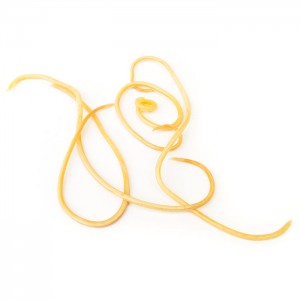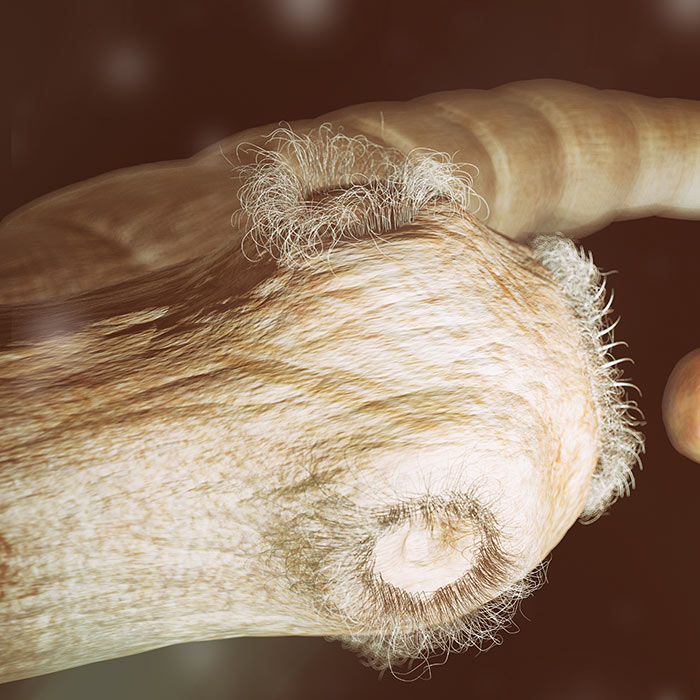What are the different types of intestinal worms in dogs?

What are intestinal worms in dogs?
Intestinal worms are parasites that live in a host animal’s intestines and feed off blood or other nutrients that they find there. Roundworms, hookworms, tapeworms and whipworms are the four common types of intestinal worms that are found in dogs. Ringworm is excluded because not actually caused by a worm; it is a fungal infection which causes skin lesions, while heartworm, an extremely serious type of parasitic worm in dogs, is found not the intestines but in the heart.
Intestinal worms in dogs can cause health complications that range from mild to potentially fatal, particularly in young pups. Here are the things you need to know about intestinal worms in dogs and tips on how to prevent them.
What are the different types of intestinal worms in dogs?
There are four major types of intestinal worms in dogs to be aware of:
1. Roundworms in dogs
 Roundworms are an extremely common parasitic worm found in dogs. While they aren’t nearly as dangerous as other parasites like heartworms and paralysis ticks, they are the most serious of the intestinal worms and can still cause your dog a great deal of sickness if they are left untreated.
Roundworms are an extremely common parasitic worm found in dogs. While they aren’t nearly as dangerous as other parasites like heartworms and paralysis ticks, they are the most serious of the intestinal worms and can still cause your dog a great deal of sickness if they are left untreated.
Roundworms can be picked up in the soil or in faeces and can be transferred from mother to puppy while in the womb or through the milk during feeding. The roundworms attach themselves to the intestinal tract and feed on their host. Adult roundworms are long, white and spaghetti-like, and live in the intestinal tract. They grow to between 9 and 18cm in length and tend to be a yellow-cream colour. They may be passed from the intestines if they fail to hold onto its walls.
Read more about roundworms.
2. Tapeworms in dogs
 A tapeworm is a parasite that attaches itself to the dog’s intestines using a system of suckers or muscular grooves. Tapeworms are long and flat with a body that consists of multiple segments, each with its own reproductive capabilities. Once in the animal’s intestine, they can reach four to six inches in length.
A tapeworm is a parasite that attaches itself to the dog’s intestines using a system of suckers or muscular grooves. Tapeworms are long and flat with a body that consists of multiple segments, each with its own reproductive capabilities. Once in the animal’s intestine, they can reach four to six inches in length.
Tapeworms do not generally cause significant signs of illness in dogs; in fact, they are known as the smart parasite because they don’t cause a great deal of damage to their host. The flea tapeworm, the most common type of tapeworm infesting dogs in Australia, is transmitted when a dog ingests an infested flea. If your dog has tapeworms, you may notice them scratching or licking their bottom, and you may see worm segments resembling small grains of white rice in their faeces.
Read more about tapeworms.
3. Hookworms in dogs
 Less than a centimetre long, hookworms have sharp, biting, hook-like mouths which they use to attach to the intestinal wall to feed on tissue fluids and blood.
Less than a centimetre long, hookworms have sharp, biting, hook-like mouths which they use to attach to the intestinal wall to feed on tissue fluids and blood.
Dogs don’t have to ingest the worms to become infected. Hookworm larvae live in the soil and can also burrow through the dog’s skin and paws. The parasite can also be passed by nursing mothers to their puppies through their milk.
Hookworm symptoms can include bloody stool, weight loss, lethargy and anaemia. In severe infestations, the level of blood loss can sometimes be fatal. Hookworms can also infect people, causing a very itchy, red rash as they travel under the skin.
Recent research from the University of Georgia has found that hookworms appear to becoming resistant to the current medications used to treat them. Read more here.
4. Whipworms in dogs
Adult whipworms live in the large intestine where their thin head burrows into the intestinal wall. The symptoms of whipworms in dogs can include watery or bloody diarrhoea, weight loss and lethargy. It is also zoonotic which means that it can be transmitted from animals to humans.
Cost of hookworm in dogs
Average claim cost* |
Highest claim cost |
| $572 | $4,071 |
*Based on PetSure claims data, 2022 calendar year. Reimbursement for these claims under a pet insurance policy, would be subject to limits, such as annual benefit limits or sub-limits, benefit percentage, applicable waiting periods and any applicable excess. Cover is subject to the policy terms and conditions. You should consider the relevant Product Disclosure Statement or policy wording available from the relevant provider. Please note that values calculated are based on all claims for that condition and medically related conditions in each calendar year.
Because it is difficult to predict the costs of veterinary care, it can help to have measures in place to help prepare for the unexpected. Pet insurance can help by covering a portion of the eligible vet bill if the unexpected does happen.
Get a quote for 2 months free pet insurance for your puppy or kitten in their first year.
How do dogs get worms?
Dogs can get worms in many different ways, even if they are very well cared for. Depending on the type of worm, there are a number of different ways in which a dog can become infested.
- From the environment
Worm eggs and larvae (juvenile worms) can be found in any environment where another dog has toileted. Dogs may ingest roundworm eggs while snuffling around in the grass or soil. Hookworm larvae can penetrate the skin, usually via the paws or belly when the dog walks over contaminated sand or soil, and then migrate to the intestine.
- Hunting
Dogs that hunt or scavenge other animals are at risk of worm infestation. Roundworms, hookworms, tapeworms and whipworms can all be contracted by eating an infected animal, such as a rodent, which contracts worms in the same mannner as dogs.
- Grooming
Worm eggs themselves or dirt from a contaminated environment can stick to the dog’s fur and then be ingested when the dog grooms itself.
- Fleas
Tapeworms are the only intestinal parasite that can be passed on through infected fleas and cannot be contracted in any other way. A dog will only be infected if it consumes a flea carrying tapeworm eggs.
How can puppies catch intestinal worms?
Roundworm infestations in puppies are common. Both roundworms and hookworms can penetrate the uterus and can therefore be transmitted to unborn puppies, as well as to young puppies through their mother’s milk.
Symptoms of roundworm in puppies include a pot-bellied appearance, stunted growth and diarrhoea. If left untreated, a roundworm infestation can lead to poor growth and even death in severe cases. Therefore, it’s vital that newborn puppies receive appropriate veterinary care.
Unsure how serious it is?
Bow Wow Meow policyholders can get access to trusted vet care anytime, anywhere, at no additional cost. Connect to an experienced Australian registered vet via video call, 24/7. Whether it’s providing vet advice, setting up at-home treatment plans, or confirming if you need to visit a vet in person, you can get help when you need it.
Find out more about our pet insurance cover options.
Can dog worms infect you in the household?
While some intestinal worms that infest dogs are zoonotic, meaning they can be transmitted to humans, people are more likely to be infested by contact with eggs or larvae in the environment, and rarely by direct contact with an infested dog.
- Roundworm is the most common parasite to be passed on from dogs to humans, and cases are more prevalent among children. Humans are usually infested when roundworm eggs are accidently ingested. The eggs can be found in the soil wherever infected dogs have passed faeces, and if ingested, the larvae can migrate to internal organs, affecting muscles, eyes and the brain. It is possible, although rare, for a human to contract roundworms from an infected dog if it licks them on the mouth.
- Dogs with hookworm will pass eggs in their faeces which hatch into larvae. The hookworm larvae can infest humans through skin contact, for e.g. if walking barefoot on contaminated sand or soil. The larvae migrate through the skin and can cause skin lesions and other more serious symptoms in humans.
- Cases of whipworm passing from dogs to people are very rare and the parasite poses little risk to humans. A different species of whipworm affects humans but this is not the same as the canine whipworm and is not transmitted by dogs.
- Tapeworm is not transmitted by dogs to humans and can only contracted by inadvertently eating an infected flea, although only a handful of cases have ever been reported in humans.
Young children are considered most at risk of a worm infestation as they are more likely to play in contaminated soil, place things in their mouths, and to have poor hand hygiene. To lessen the likelihood of any transmission from dogs to humans, it is important to deworm your dog regularly and ensure good hygiene practices such as washing hands after handling pets and before eating.

Symptoms of worms in dogs
Symptoms of worms in dogs can vary significantly, depending on the type of worm and the age of the dog. Many dogs will present none or few symptoms, but they can sometimes include:
- Diarrhoea
- Vomiting
- Abdominal pain
- Swollen, pot-bellied abdomen (one of the most common symptoms of worms in puppies)
- Weight loss
- Lethargy
- Scooting, itchy bottom
- Dehydration
- Nutritional deficiencies
- Blood in the stool
- Poor coat appearance
- Cough (normally only seen in roundworm and hookworm infections)
- Blocked intestine (only in severe cases infestations)
- Pneumonia (only seen in serious cases of roundworm)
If you notice any of these symptoms, you should speak with your vet about the possibility of a worm infestation. However, there are other possible causes of these symptoms and so it is important for your vet to assess your dog to make the correct diagnosis. Also be aware that sometimes there are no symptoms at all, for example, usually there are no symptoms of tapeworm in dogs, and the only way to know is by veterinary examination. For this reason, regular checkups are essential, and even when there are no symptoms, it is wise to take a stool sample to your vet when your dog is having its annual examination.
How to diagnose worms
Occasionally, worms may be seen in dog faeces. However, not all kinds of worms are visible to the naked eye. Your dog may have worms and pass only tiny worm eggs which are too small to be seen, so don’t rely on seeing worms in your dog’s faeces as an indicator of worms. Therefore, your veterinarian will require a stool sample for a definitive diagnosis.
Visible worms in dog poo
- Flea tapeworm segments look like grains of rice
- Roundworms look like spaghetti
Faecal examination for worms in dog poo
It usually requires laboratory testing to diagnose a worm infestation as worm eggs are not visible to the naked eye. The most common type of test performed is called a faecal flotation, which relies on the fact that worm eggs will float when faeces is mixed with certain solutions. Faecal flotation samples are then examined under the microscope to look for eggs and identify the type of worm, as the eggs of different species can look quite different.
Treatment of worms in dogs
 While intestinal worms in dogs are common, they are also very treatable. Treatment promptly reduces health risks to your dog, as well as the risk of the worms spreading. While roundworms usually don’t cause illness, sometimes they can make dogs very sick. Tapeworms, hookworms and whipworms are less of a health threat unless present in large numbers. Nevertheless, if left untreated, serious health complications can develop.
While intestinal worms in dogs are common, they are also very treatable. Treatment promptly reduces health risks to your dog, as well as the risk of the worms spreading. While roundworms usually don’t cause illness, sometimes they can make dogs very sick. Tapeworms, hookworms and whipworms are less of a health threat unless present in large numbers. Nevertheless, if left untreated, serious health complications can develop.
Always consult your vet on the best treatment for your dog. There are numerous types of deworming medications available which both prevent and treat some or all types of intestinal parasites. These can be administered by injection, tablet, or through spot-on treatments. A single deworming treatment often won’t completely get rid of all worms in your pet’s body and repeat treatments may be necessary to eliminate the infestation. Be aware that you may not see dead worms in the stool as they can be digested.
If you have any concerns or questions about your dog’s health, it’s best to speak to your vet.
Prevention of worms in dogs
Preventative medications, flea control, and clean-up of dog waste can help you avoid serious problems.
- Your vet can recommend preventative deworming medications that are appropriate for your dog’s specific requirements. Regular deworming decreases the risk of your dog becoming infested and requiring more expensive treatment. Some worms in dogs can live for months or even years and so it is important to deworm regularly. Make sure you are giving the correct dose for your dog’s body weight and check which types of worm are controlled by each treatment.
- Another major source of infection of roundworms, hookworms and whipworms for dogs is through ingestion of contaminated soil, even months later when there no trace of the faeces which contaminated the soil. It is therefore crucial that dog owners always clean up after their pets.
- Effective flea prevention treatment should be administered to prevent your dog from contracting tapeworms.
Bow Wow Meow Pet Insurance can help protect you and your dog should an unexpected trip to the vet occur.
-
Find out more about our dog insurance options
-
Get an online pet insurance quote











